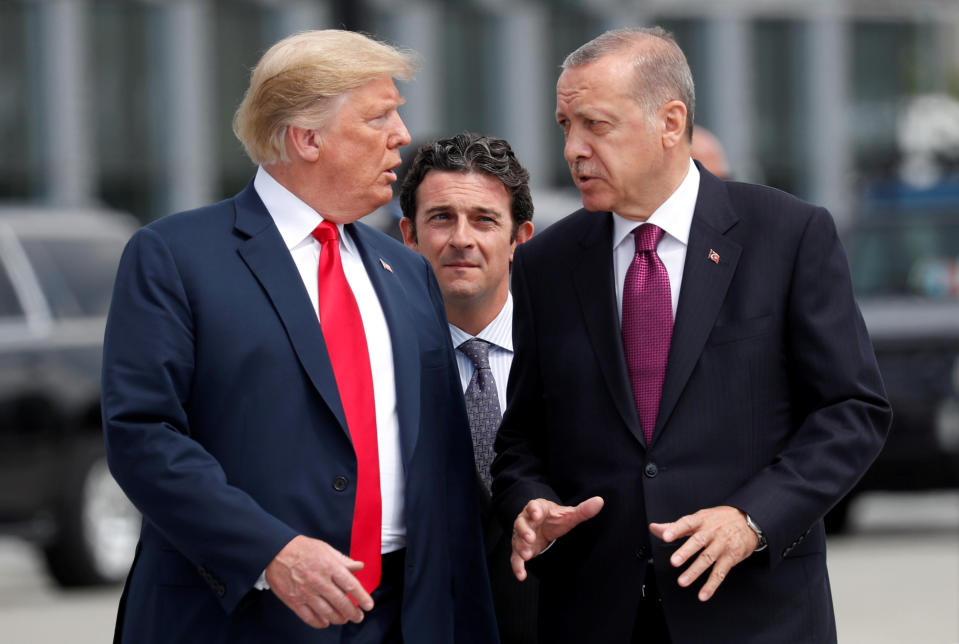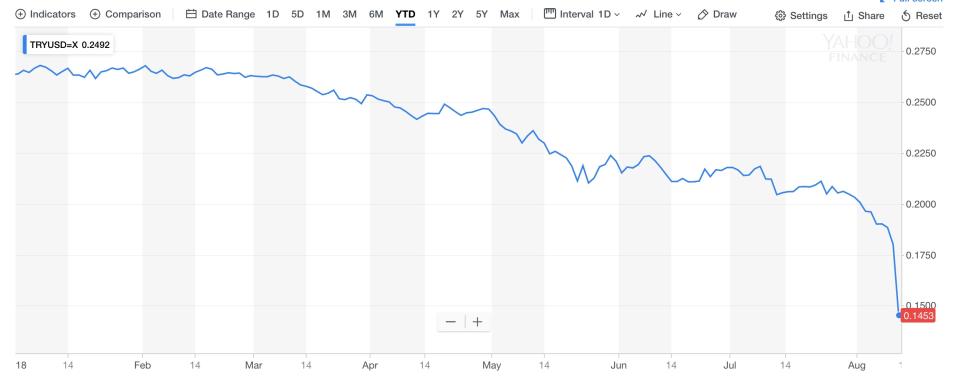It's not all about Trump. The US-Turkey relationship has been decaying since 2003
The Turkish currency Lira is in crisis again after Donald Trump started another proverbial fire.
Apart from starting trade wars with the world’s second largest economy China, as well as provoking a major fallout with the European Union, the US president confirmed that he’s slapping Turkey with higher tariffs.

But while Turkey’s President Recep Tayyip Erdogan said the US was looking to “stab it in the back” and the move seems to look like the latest in a long line of trade wars Trump is starting, it’s worth noting that the US has had a fraught relationship with Turkey for 15 years, especially under Republican governments.
The tariff news made Turkey’s stock market crater 17% and the cost of borrowing for the government has been pushed up by nearly 20%. Inflation has also hit 15%. With fears growing that the country is crashing into an economic crisis, the Turkish lira has fallen by over 20% since higher US tariffs were announced.
This has then subsequently led to a currency crisis in the country. The central bank has waded in, pledging that it is ready to take “all necessary measures” to ensure financial stability, including providing banks with “all the liquidity the banks need.”

While you can be forgiven in thinking that this fallout is just one of the latest examples in Trump’s long line of “America First” protectionist plans which threatens financial and diplomatic relations, it’s worth noting that the US has had a fraught relationship with Turkey for 15 years.
It all started back in 2003 when George W. Bush’s administration took the US to war. His administration invaded Iraq and caused chaos for the country as well as for Turkey. That’s because Iraq sits on Turkey’s south-eastern border and when a nation goes to war, its neighbours feel the pain.
‘The great underreported story of the Iraq War’
The Council on Foreign Relations Special Report warned back in 2006 that it was crucial to mend this relationship. “The growing schism between the West and the Islamic world is one of the primary challenges confronting American foreign and defence policymakers. As a consequence, the relationship between the United States and Turkey—a Western-oriented, democratising Muslim country—is strategically more important than ever,” said the authors.
A year later, while the war exacerbated Turkey’s ills and helped fuel a grinding point for its economic growth in 2007, experts highlighted in media interviews that the Turkish and US relationship was the “great underreported story of the Iraq War.”
Researchers from Massachusetts Institute of Technology and Turkey-based Koc University also added “the character and quality of Turkish economic growth” heavily degraded after Turkey diverted from away from democratic reform.
The explosive case of Syria
Former US president Barack Obama helped alleviate that tense relationship for a brief time when he took office in 2008 but that fragile repair job deteriorated as the Syrian civil war started.
The US was also painted in a corner because if it moved to mend relations with Turkey, it also endangered its ties with Kurdish fighters, who have been described as “the backbone of the US campaign against the Islamic State in Syria.”
The US is between a rock and a hard place as the nation has been supporting the Kurdish rebel group fighting ISIS while Turkey is battling Kurdish insurgency in its own country.
American pastor Andrew Brunson provided a spark for the powder keg of diplomatic relations.
Two years ago, Turkey detained Brunson for allegedly having links to the now outlawed Kurdistan Workers’ Party and the Gulenist movement— both of which have been blamed by Erdogan for a failed coup in 2016. Turkey has refused to release him. At the same time, Erdogan has publicly vented that the US has not taken stronger action against the Gulenist movement.
What will be the fallout?
Trump’s decision to double tariffs has started the ball rolling on a number of complex diplomatic issues that could have catastrophic effects on several economies in the worst case scenario.
Turkey’s president Erdogan said Monday that the US was seeking to “stab it in the back” and “you act on one side as a strategic partner, but on the other, you fire bullets into the foot of your strategic partner. We are together in Nato and then you seek to stab your strategic partner in the back.”
Turkey is part of NATO, so this will also exacerbate the Trump administration’s fragile relationship with the group over defense spending. Meanwhile Erdogan is getting closer to Russian president Vladimir Putin, which will cause a headache for the US as well as within NATO since Russia is the group’s number one threat. NATO is obliged to defend any member that is attacked by Russia.
Meanwhile, Turkey’s economic meltdown could potentially be catastrophic for the eurozone economy. As analysts at Strategas pointed out in a note this week, Spanish, French, and Italian banks are the European institutions most exposed to Turkish debt. This means if bonds collapse, they could find themselves with sovereign debt crisis on their hands.
Lianna Brinded is head of Yahoo Finance UK.
Read more:
This chart shows why everyone should be worried about Turkey’s economic meltdown
Why the UK property market is causing a tornado of pain for Brits


